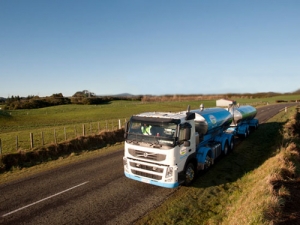Fonterra’s exit from Australia ‘a major event’
Fonterra’s impending exit from the Australian dairy industry is a major event but the story doesn’t change too much for farmers.
 Chairman John Wilson says the stable forecast reflects the board's and management's view that international prices will continue to improve in the first half of next year.
Chairman John Wilson says the stable forecast reflects the board's and management's view that international prices will continue to improve in the first half of next year.
Fonterra today maintained a forecast farmgate milk price of $4.60/kgMS.
Along with the November announced estimated earnings per share range of 45-55 cents, this amounts to a total available for payout of $5.05-$5.15/kgMS and would currently equate to a total forecast cash payout of $4.95-$5/kgMS.
Fonterra is required to consider its forecast farmgate milk price every quarter as a condition of the Dairy Industry Restructuring Act (DIRA).
Chairman John Wilson says the stable forecast reflects the board's and management's view that international prices will continue to improve in the first half of next year.
"We are looking out over the next nine months and basing our forecast on the view that current, unsustainably low prices will continue to impact production levels globally.
"We support the consensus view in the market that an improvement will take place, but the market remains volatile. While there are signs of a recovery, particularly in China, we still need the imbalance between supply and demand to correct."
Wilson says the imbalance is starting to reduce with year-to-date production in the United States up by only 1% and slowing, and New Zealand volumes expected to be down by at least 6% over the current season. "In the EU, however, farmers are continuing to push production, currently up 1%."
Fonterra's Board also reviewed the Fonterra Cooperative Support loan. The loan was made available on production from June 1 to December 31. The loan of 50c/kgMS is interest-free until May 31, 2017 with repayments triggered when the farmgate milk price exceeds $6/kgMS.
Wilson says the board's scheduled review weighed up the improved farmgate milk price and higher earnings per share forecast since the loan was launched, when the milk price was at $3.85, and the need for financial discipline from the co-op.
The board had decided not to continue the cooperative support loan for milk collected after December 31, but will monitor conditions and assess the need to continue the support if market conditions changed later in the season.
"We will provide some $390 million in support to around 75% of our farmers through the most productive half of the season, including the peak. Farms typically produce 60% of their milk in the first half, with production beginning to taper off from December, so we have provided support when it is needed the most."
Fonterra’s impending exit from the Australian dairy industry is a major event but the story doesn’t change too much for farmers.
Expect greater collaboration between Massey University’s school of Agriculture and Environment and Ireland’s leading agriculture university, the University College of Dublin (UCD), in the future.
A partnership between Torere Macadamias Ltd and the Riddet Institute aims to unlock value from macadamia nuts while growing the next generation of Māori agribusiness researchers.
A new partnership between Dairy Women’s Network (DWN) and NZAgbiz aims to make evidence-based calf rearing practices accessible to all farm teams.
Despite some trying circumstances recently, the cherry season looks set to emerge on top of things.
Changed logos on shirts otherwise it will be business as usual when Fonterra’s consumer and related businesses are expected to change hands next month.
OPINION: Fonterra may be on the verge of selling its consumer business in New Zealand, but the co-operative is not…
OPINION: What does the birth rate in China have to do with stock trading? Just ask a2 Milk Company.